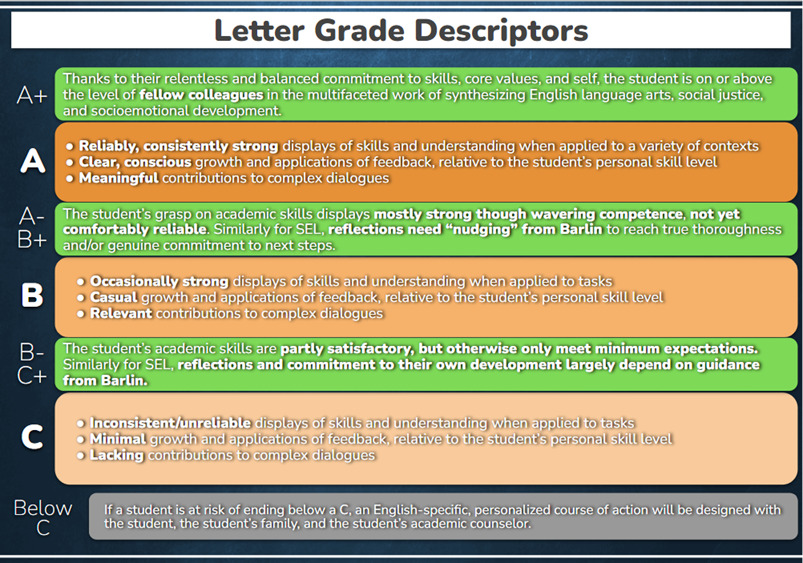
When Grading Is “Pointless”: A Case for Comments-Only Feedback
As educators who focus on facilitating meaningful learning and genuine reflection, we are painfully familiar with the questions students often ask that demonstrate anything but:
As educators who focus on facilitating meaningful learning and genuine reflection, we are painfully familiar with the questions students often ask that demonstrate anything but:
These questions can deeply frustrate educators in pursuit of developing learners’ senses of intrinsic motivation—though personally, the moment that made me dramatically reorient my grading practices wasn’t such a question from a student but a student’s powerfully poignant reflection.
Three years ago, I facilitated a class dialogue to explore students’ thoughts on potential revisions to our grading system. In a moment of impressive vulnerability, a student named Hannah shared her takeaways from our literary journalism task: “You gave me the most loving and uplifting feedback I’ve ever received on my writing—but no matter how hard I tried, I couldn’t stop thinking about how I got a 47 out of 50, and not a perfect score.”
Hannah named a cognitive dissonance that so many students experience and with which many educators can empathize (Butler, 1987). The fundamental purpose of feedback is to guide learners toward growth—but educators and students alike know the feeling of when that guidance is obscured by points (or the lack thereof). We don’t want to perpetuate deleterious perfectionist tendencies, leading learners to believe that this illusory idea of “perfect” can even be quantified. Instead, we want learners to focus on becoming lifelong thinkers and doers for their own sake, not for the sake of more points.
So three years later, I’m here sharing with you the “why” behind the pedagogical shift to comments-only feedback that Hannah and other students led me to make—so that you can begin considering what the “how” can look like in your own practice.
Coined by educator Sarah M. Zerwin (2020), “pointless” or comments-only feedback is an approach that eliminates numerical scoring from the assessment process, focusing solely on reflections, qualitative comments, and progress markers (e.g., “exceeded expectations,” “partial understanding”). The approach encapsulates feedback that is only qualitative; after all, when students receive both points and comments on tasks (such as with points-based rubrics), they tend to focus on the points. Once removed, points no longer distract learners, diminishing the cognitive dissonance that students like Hannah experience between numerical perfection and intrinsically motivated growth.
Zerwin also reminds us that comments-only feedback is the norm for settings where one isn’t a student: percentages, scores, and grades are rarely part of daily life after graduation; instead, qualitative insight from peers and mentors guides our growth as professionals.
To maintain a baseline “shared language” for tracing growth, this method trades points for scales. For examples, see Figure 1 for qualitative scales I designed to succinctly inform a learner of their proximity to course objectives, on a task overall or with discrete skills specifically; progress markers always came with an additional specific comment.

Instead of scoring a task as, say, 38 points out of 50, we offer an “applying” marker, providing the learner with a clearer sense of achievement and of subsequent next steps. By taking out the quantitative, we necessarily focus on the more meaningful qualitative.
In an educational culture that prioritizes numerical grading, educators and their students will understandably find comments-only feedback a bit awkward at first. Despite the initial challenges, if the primary aim of feedback is to empower learners to take realizable steps toward growth, investment in comments-only feedback yields an array of benefits:
Whether a course uses a hybrid of point-based and comments-only tasks or entirely commits to comments-only feedback, the final grade reflects a synthesis of student self-assessments, educator observations, and evidence of growth through performance tasks. Ideally, as with any grading system, how comments lead to final grades highly depends on the idiosyncrasies and evolving needs of educators and their students. My class opted for a portfolio system, evaluated according to letter grade descriptors that I cocreated with students, as shown in Figure 2. Students compiled their performance tasks, feedback, and self-reflections into portfolios; at the end of the semester, students and I individually conferenced to determine which letter grade descriptor best aligned with their portfolios.

There is no one right answer for how to synthesize qualitative observations into a summative grade. From basing grades on students’ end-of-course reflections to conferencing with students to reach consensus on a letter to simply assigning a letter justified by the educators’ holistic, comments-only feedback—there are many reasonable approaches that justify a final grade and scaffold students’ self-awareness.
It would be ironic to claim that comments-only feedback, which attempts to dismantle perfectionism and ignite lifelong learning, is a perfect grading system. Merely considering a grading system outside conventional wisdom is, in and of itself, a perplexing yet worthwhile line of pedagogical inquiry:
Especially given these complex and uncomfortable questions to which we are still, and always will be, developing answers, adhering to the norm of assigning points to tasks will likely feel comfortable and concrete. This system for assessment and reflection has been, for so many of us, all that we have experienced or perpetuated, so to stray from this norm is inherently unsettling.
But such discomfort is inherent to the experimentations, forward failings, and eventual progress necessary for redesigning paradigms that newly empower our students. A transition to comments-only feedback isn’t just a pedagogical shift: it’s a cultural one. Whether in our unique courses or across institutions, we as educators can foster cultures where learning is unambiguously a lifelong process, where failures become genuine opportunities—and where students like Hannah, who triggered this pedagogical shift in me in the first place, no longer have the fullness of their achievements obscured by points.
Brookhart, S. M. (2017). How to give effective feedback to your students. ASCD.
Butler, R. (1987). Task-involving and ego-involving properties of evaluation: Effects of different feedback conditions on motivational perceptions, interest, and performance. Journal of Educational Psychology, 79(4), 474–482. https://doi.org/10.1037//0022-0663.79.4.474
Hattie, J., & Timperley, H. (2007). The power of feedback. Review of Educational Research, 77(1), 81–112. https://doi.org/10.3102/003465430298487
Tomlinson, C. A. (2014). The differentiated classroom: Responding to the needs of all learners (2nd ed.). Pearson Education.
Zerwin, S. M. (2020). Point-less: An English teacher’s guide to more meaningful grading. Heinemann.
Aaron Barlin, MSEd, is a faculty member at the Rex and Margaret Fortune School of Education. He coaches both secondary and postsecondary educators on integrating social justice standards and social-emotional learning competencies. Outside Fortune, he consults with institutions and organizations around diversity, equity, and inclusion through “Emergent Change DEI.”